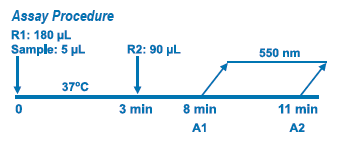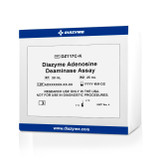The Diazyme ADA Assay is based on the enzymatic deamination of adenosine to inosine which is converted to hypoxanthine by purine nucleoside phosphorylase (PNP).
| Product | Catalog Number | Format |
|---|---|---|
| Kit | DZ117C | R1: 1 x 50 mL R2: 1 x 25 mL |
| Calibrator | DZ117C-CAL | Cal: 1 x 1 mL |
| Control | DZ117C-CON | Con: 2 x 1 mL |
Product Features
- Diazyme's ADA assay has been found to show virtually no ammonia interference.
- Multiple published studies in major journals worldwide have highlighted the excellent accuracy, precision and reliability of the Diazyme enzymatic Non-Giusti method in serum, heparinized plasma, plural effusion, pericardial effusion, and CSF fluids.
- Fast test results (10 minutes) for a rapid turnaround time
- Liquid stable format requires no reagent preparation
- Wide range of instrument parameters available for simplifying implementation
Downloads
Assay Principle
The Diazyme ADA Assay is based on the enzymatic deamination of adenosine to inosine which is converted to hypoxanthine by purine nucleoside phosphorylase (PNP). Hypoxanthine is then converted to uric acid and hydrogen peroxide (H2O2) by xanthine oxidase (XOD). H2O2 is further reacted with N-Ethyl-N-(2-hydroxy-3-sulfopropyl)-3-methylaniline (EHSPT) and 4-aminoantipyrine (4-AA) in the presence of peroxidase (POD) to generate quinone dye which is monitored in a kinetic manner.

Intended use
Adenosine Deaminase (ADA) Assay Kit is for determination of ADA activity in serum, plasma, pleural fluid, and cerebrospinal fluid samples. For Research Use Only in the USA. Not For Use in Diagnostic Procedures.


